General
President Museveni Reopens Makerere’s Main Building, Installs Dr. Kiyonga as Chancellor
Published
1 year agoon
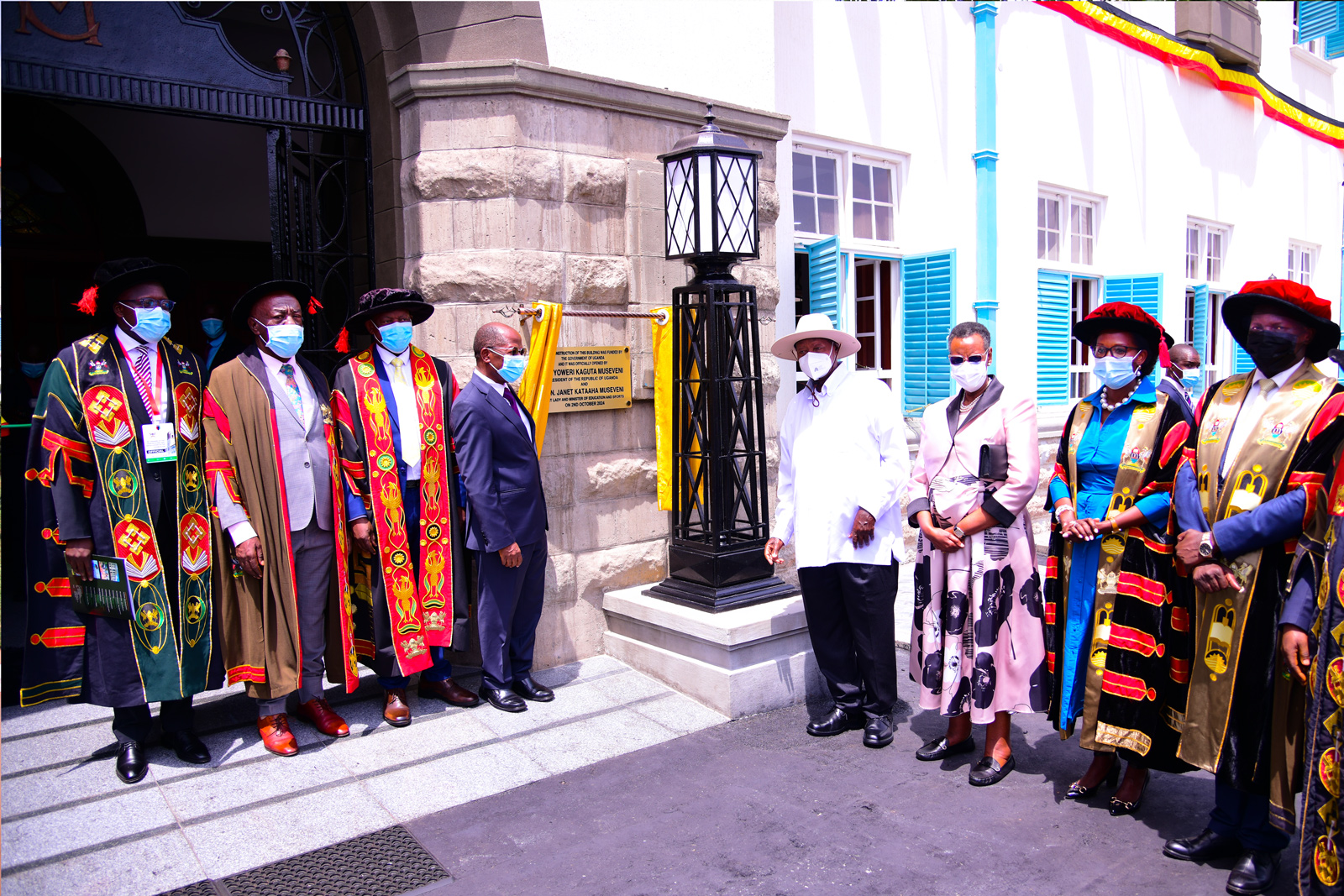
On 2nd October 2024, President Yoweri Kaguta Museveni officially opened the re-constructed Makerere University’s iconic Main Building, and installed Dr. Crispus Kiyonga as the new Chancellor.
The event held at Makerere University’s Freedom Square, was presided over by President Museveni, the university’s Visitor, alongside First Lady, Hon Janet Kataaha Museveni, who is also the Minister of Education and Sports.
Several dignitaries attended the ceremony, including former Chancellors, Vice Chancellors, members of the University Council, administration, development partners, a delegation from the University of Bergen in Norway as well as alumni of Makerere University. The reopening of the main building comes four years after a disastrous fire that resulted from a short circuit destroyed the building in September 2020.
Speaking at the event, President Museveni congratulated the university for getting back the building which has been funded by the government of Uganda. He added that his initial concerns about the potential loss of student records, but he was relieved when he was reassured by the Vice-Chancellor Professor Barnabas Nawangwe that the records were safe.
“When this unfortunate incident happened, as Professor Nawangwe said, my main concern was the records of the students. For the building, we could construct a new one, and we have constructed it,” he said.
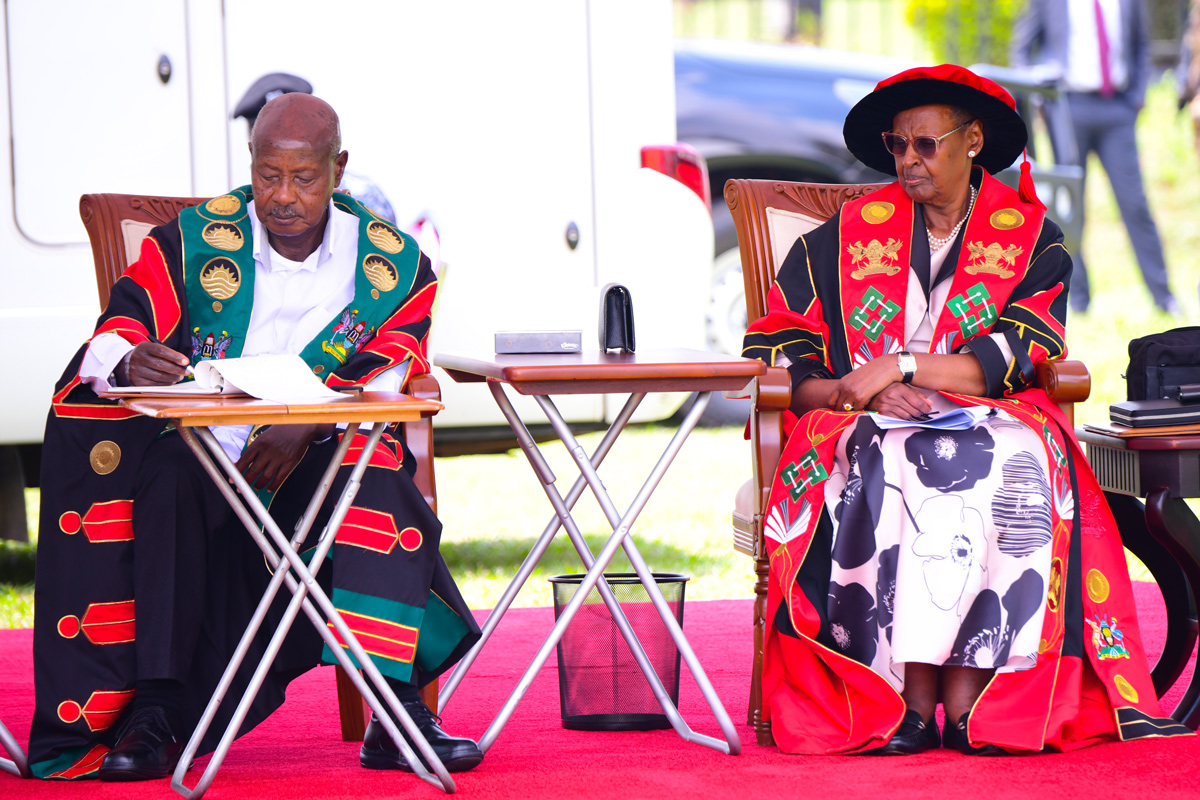
The reconstruction preserved the building’s historic exterior while modernizing the interior to enhance safety and accessibility. Traditional wooden floors were replaced with tiles and terrazzo, and pathways for persons with disabilities were added. The building also features more durable concrete walls, fire detection and fighting equipment, and a restored bell that rings every hour.
President Museveni also congratulated the university on appointing Dr. Crispus Kiyonga as Chancellor, succeeding Prof. Ezra Suruma. He praised Dr. Kiyonga as a longstanding and key figure in the National Resistance Movement (NRM).
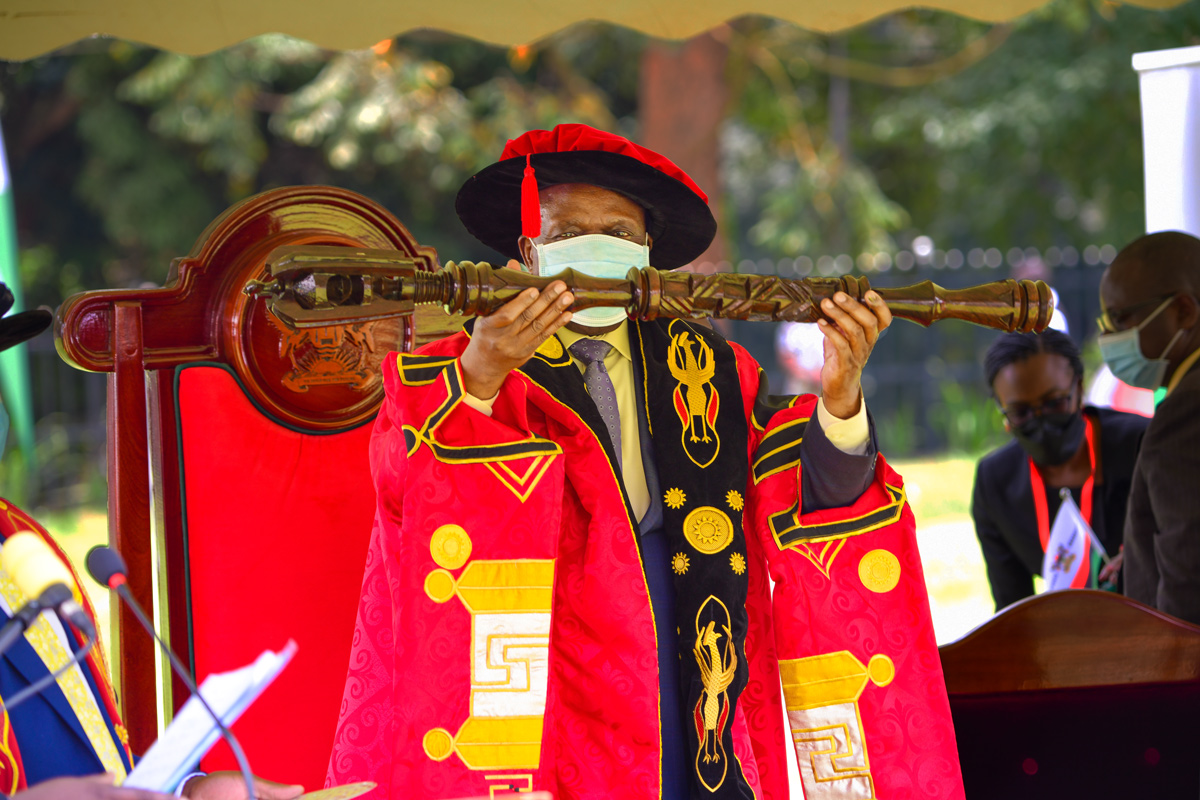
“Secondly, I want to congratulate you on having a new chancellor, in the person of Dr. Crispus Kiyonga. He is an outstanding cadre and leader of the NRM. He is a member of the central executive committee and has been very active in our efforts since 1980 when we were involved with UPM, so I congratulate him and I congratulate the University,” The President said.
The President explained the fundamental role of some disciplines at Makerere University such as Food Science and Quantitative economics. He also underscored the relevance of science disciplines to national development.
Hon. Janet Museveni, the Minister of Education thanked President Museveni for his swift response when Makerere’s ivory tower was destroyed by the fire. She also commended the President for providing funds for the renovation of the students’ halls of residence.
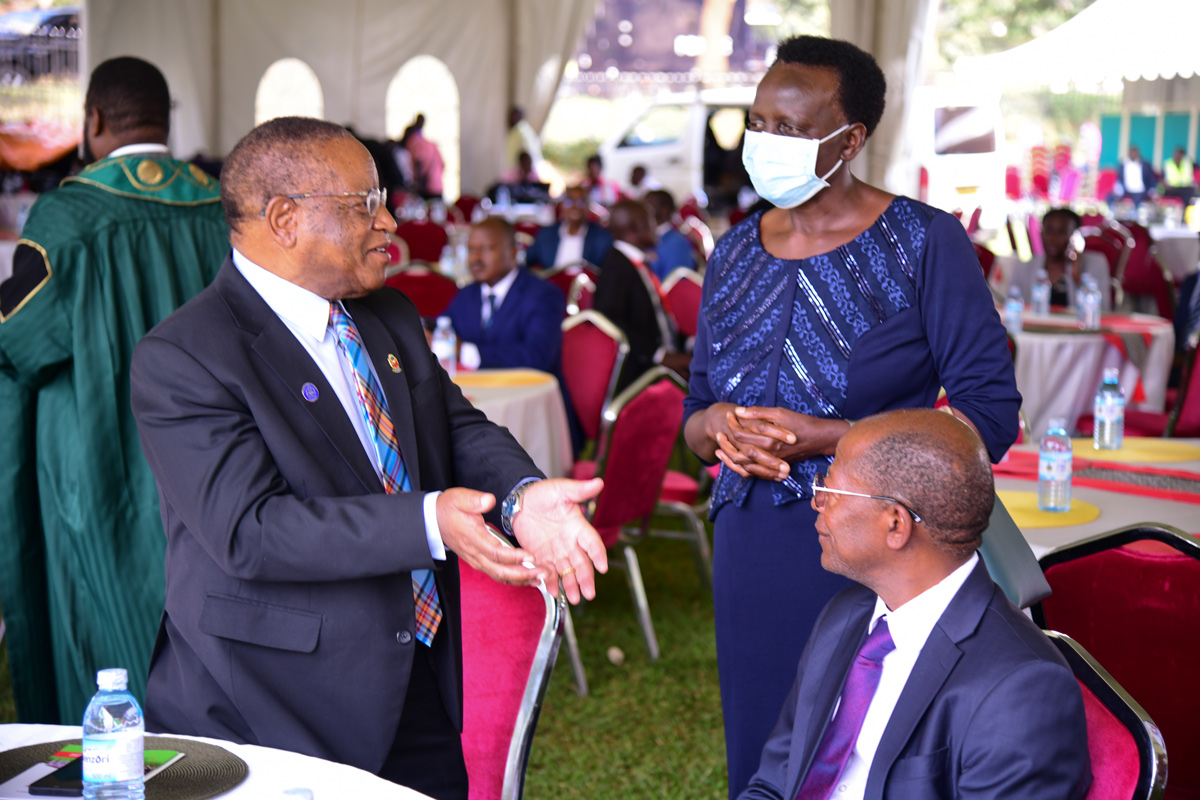
“On behalf of the education sector, I thank you, Your Excellency, for your immediate directive to fund the restoration of the iconic building and other critical projects at Makerere including the students’ residences following a request from the University Council. Your timely intervention, Mr. President underscores your unwavering support for the higher education sector and Makerere University in particular,” she said.
Dr. Kiyonga expressed gratitude for his appointment and emphasized his commitment to strengthening ties between the university, government, and the broader community. He promised to work closely with Vice Chancellor, Prof. Nawangwe and other stakeholders to align Makerere University’s research with Uganda’s development agenda.
Mrs. Lorna Magara, the Chairperson of the University Council, thanked the government for funding several projects at Makerere, including the restoration of the main building, the construction of the new building for the Law School, and the renovation of halls of residence.
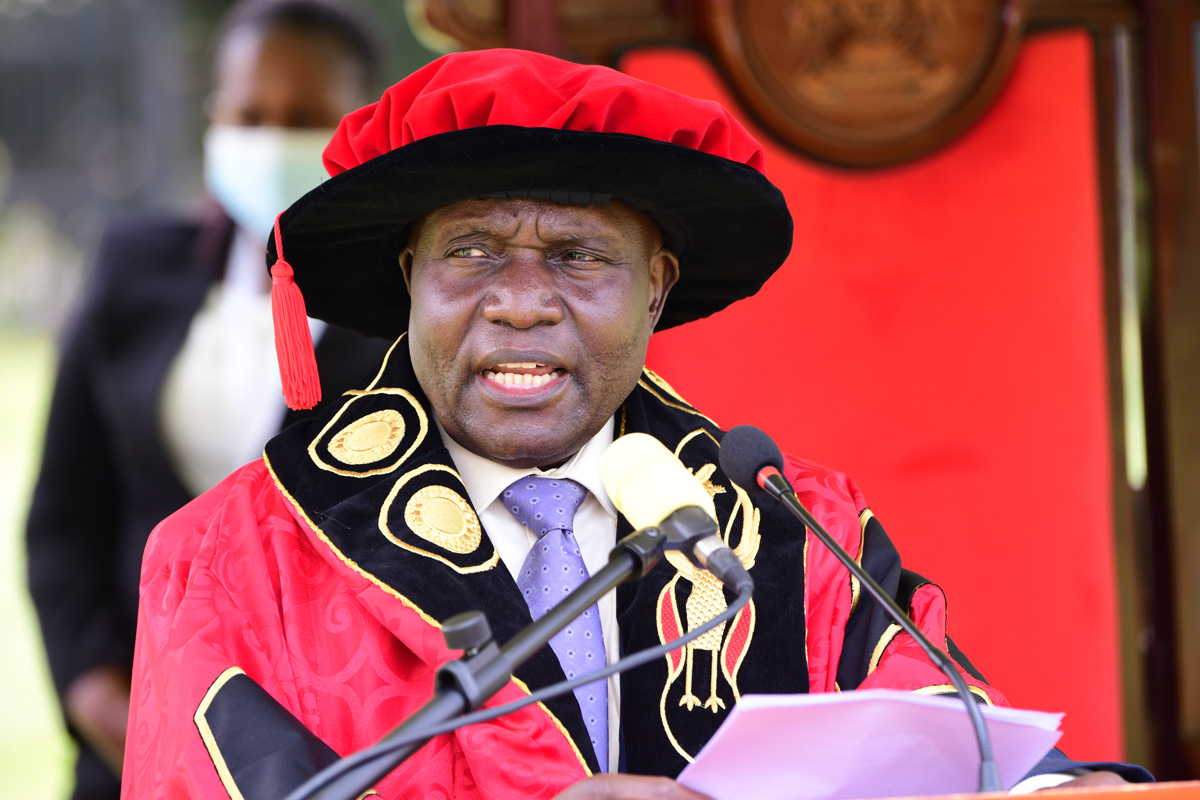
“The restoration of the main building strongly symbolizes the government’s commitment to investing in Makerere University and indeed the education sector. In addition to the main building, the government has generously funded several infrastructural projects including the construction of the School of Law new building, the school of dentistry, the renovation of Lumumba Hall, the wall around the university, and several others,” she said.
“We extend our heartfelt appreciation to the ministry of finance, planning and economic development for implementing the president’s directive and providing the necessary funding for these critical projects,” she said.
The Vice Chancellor, Prof. Nawangwe, thanked the President for swiftly approving the release of funds for the restoration of the building after he had presented the case to the Cabinet.
He also highlighted that the basement of the restored building will be reserved for a museum, and the university hopes to host the Luweero War Memorial Museum in this space.
When Prof. Henry Alinaitwe and I, came to the Cabinet to explain the cause of the fire, you guided the Cabinet to immediately approve the release of the 21 billion shillings that were required to reconstruct the building. Your excellency and Mama Janet, this afternoon, we have just re-opened the reconstructed main building, and the building is entirely funded by the government of Uganda,” he said.
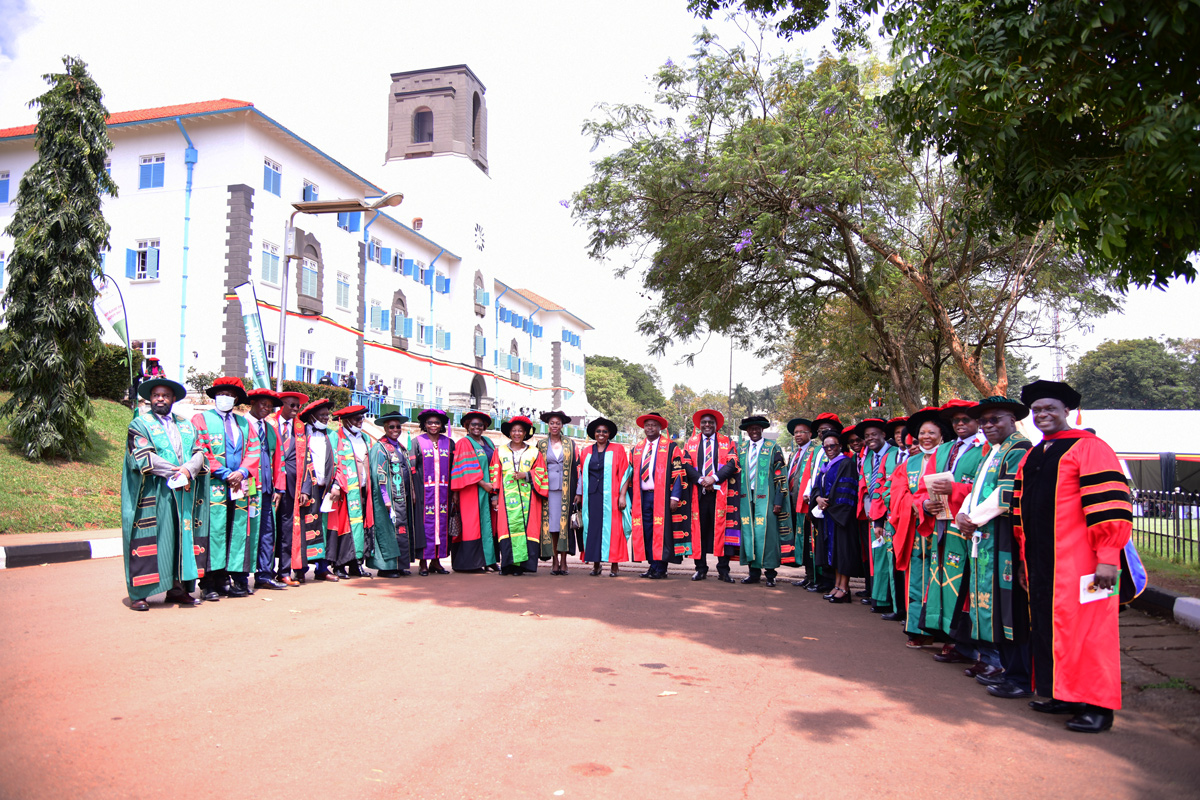
The Vice-Chancellor also used the opportunity to request the President that the government provides Makerere University with a road maintenance unit under the National District Road Maintenance Program.
He explained that such a unit would allow engineering students to gain practical experience by maintaining university roads and those in nearby communities. This initiative, he added, would contribute to producing well-trained engineers who could strengthen the construction industry in Uganda.
“We wish to enhance the training of our engineers through advanced technical and business development skills so that they can compete with international firms. We therefore request for your support, Your Excellency to consider Makerere University in form of a district for the allocation of a road maintenance unit as part of the district road maintenance unit program,” he requested.
“With this unit we would be able to train our students by maintaining the university’s roads and the roads of the surrounding communities. The ultimate aim is to produce engineers who will build strong constructing firms for our country. I pray that this proposal is given consideration in the next financial year budget.”
In response, President Museveni welcomed the idea and offered his support, agreeing that it would provide valuable practical learning for Makerere’s students.
“Regarding the road unit, that is a very good idea, I will definitely support that so that you can have your own road unit to teach your engineers how to make roads and how to build practically. I totally agree with that,” President Museveni said.
The Vice Chancellor appreciated the Mastercard Foundation for the support extended to Makerere University when the Main Building was gutted by a fire. “I received the first international call, from Reeta Roy, President of the Mastercard Foundation, who in a very short statement said: We are going to support you with one million dollars to help you recover the student records. Indeed, the seed sown by the Mastercard Foundation has transformed Makerere into one of the most digitalised universities,” he said.
The Guild President, Lubega Vincent Nsamba acknowledged the President for providing funds for the reconstruction of the main building, but most importantly providing funds to renovate the different halls of residence.
“I thank you for the funds that have been contributed to the reconstruction of the main building, but most importantly and particularly to the renovation of halls of residence. They have completed Lumumba hall and they are now at Mary Stuart,” he said.
“We extend a vote of appreciation for recognizing that need and providing funds to cater for that. This has not only contributed to the welfare of the students, and has also improved their academic life on Campus,” he added.
You may like
-


Meet Najjuka Whitney, The Girl Who Missed Law and Found Her Voice
-


Makerere University School of Public Health Graduates First Cohort of Cost-Effectiveness Analysis Short Course
-
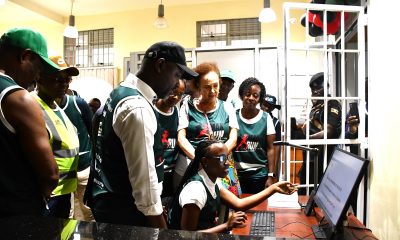

Students empowered to thrive through the Semester
-


Climate variability found to shape malaria trends in Yumbe District
-


Mak hosts First African Symposium on Natural Capital Accounting and Climate-Sensitive Macroeconomic Modelling
-


Uganda Martyrs Namugongo Students Turn Organic Waste into Soap in an Innovative School Project on Sustainable Waste Management

The 76th Graduation Ceremony of Makerere University will be held from Tuesday 24th to Friday 27th February, 2026. A total of 213 PhDs (87 female, 126 male), 2,503 Masters (1,087 female, 1,416 male), 206 Postgraduate Diplomas (80 female, 126 male), 6,343 Undergraduate Degrees (2,999 female, 3,344 male), and 30 Undergraduate Diplomas (9 female, 21 male) will be graduating from all the Colleges.
Ms. Sarah Aloyo and Ms. Nakato Dorothy both students of the Bachelor of Procurement and Supply Chain Management emerged as the best in the Humanities and Best Overall students with a CGPA of 4.93. Mr. Ssewalu Abdul, a Bachelor of Leisure and Hospitality Management student emerged second best in the Humanities with a CGPA 4.90. Ms. Esther Ziribaggwa emerged as the best student in the Sciences with a CGPA of 4.77 in the Bachelor of Agricultural and Rural Innovation, while Mr. Simon Mungudit emerged second best in the Sciences with a CGPA of 4.76 in the Bachelor of Science in Petroleum Geoscience and Production.
Commencement Speakers
- Day 1 – Prof. Nicholas Ozor, the Executive Director of the African Technology Policy Studies Network, Nairobi, Kenya
- Day 2 – Prof. Dr. Maggie Kigozi, Chairperson Makerere University Endowment Fund Board
- Day 3 – Dr. Patricia Adongo Ojangole, Managing Director, Uganda Development Bank Limited
- Day 4 – Ms. Reeta Roy, Former President & Chief Executive Officer, Mastercard Foundation
The 76th Graduation Ceremony will be held at the Freedom Square following the schedule below:
Tuesday, 24th February, 2026
College of Agricultural and Environmental Sciences (CAES)
College of Computing and Information Sciences (CoCIS)
College of Education and External Studies (CEES)
School of Law (SoL)
Livestream Link for Day 1: https://youtube.com/live/wVGPA0FJ9pU
Wednesday, 25th February, 2026
College of Health Sciences (CHS)
College of Natural Sciences (CoNAS)
College of Veterinary Medicine, Animal Resources and Bio-security (CoVAB)
School of Public Health (SPH)
Thursday, 26th February, 2026
Makerere University Business School (MUBS)
College of Business and Management Sciences (CoBAMS)
Friday, 27th February, 2026
College of Engineering, Design, Art and Technology (CEDAT)
College of Humanities and Social Sciences (CHUSS)
Institute of Gender and Development Studies (IGDS)
Makerere Institute of Social Research (MISR)
General
Mak Selected to Host Alliance for African Partnership Africa Office
Published
1 day agoon
February 23, 2026
Makerere University has been selected to host the Africa Office of the Alliance for African Partnership (AAP). The significant milestone that underscores Makerere’s role in fostering research, innovation, and global collaborations across the continent was announced at a meeting of the University’s Central Management with an AAP delegation on 23rd February 2026.
Makerere’s selection was based on the University’s robust commitment, alignment with the AAP’s Strategic Plan, and proven ability to manage consortium activities. The AAP, which was initiated by Michigan State University (MSU) in collaboration with Ten African Universities and agricultural policy research networks in 2016, targets critical challenges in education, youth empowerment, health and nutrition, agri-food systems, science and technology, water, energy, environment, and culture and society.
Addressing the delegation consisting of AAP Co-Directors from MSU, Dr. Jose Jackson-Malete and Dr. Amy Jamison, accompanied by newly-appointed Director of the AAP Africa Office, Dr. Racheal Ddungu Mugabi and Ms. Clare Cheromoi, the Vice Chancellor, Prof. Barnabas Nawangwe who appreciated the choice of Makerere to host the Africa Office said:
“One of the greatest challenges facing African universities is PhD training, particularly supervisory capacity. Through partnerships such as the Alliance for African Partnership we can leverage international expertise to strengthen supervision—whether through training supervisors or through joint supervision arrangements.”
Prof. Nawangwe equally applauded joint initiatives such as the Grant Writing and Publication project, which gave rise to the establishment of a Writing Centre that he said can be used to build capacity in AAP member universities with Makerere as the hub. Officially launched on 21st March 2023, the project is living up to its expectation of becoming a springboard for strong postdoctoral collaborative research for both institutions and other US universities.
Dr. Titus Awokuse, Vice Provost and Dean for International Studies and Programs at Michigan State University (MSU) who attended virtually, reiterated that Makerere’s selection reflects its long-standing commitment to advancing African higher education, research excellence, and meaningful global collaboration.
Reflecting on the origins of the Alliance for African Partnerships (AAP), Dr. Awokuse explained that nearly a decade ago, MSU initiated a transformative conversation in Atlanta centered on the question: How should we partner differently? From this dialogue emerged AAP—an Africa-centered consortium that now brings together 12 institutions across Africa and the United States.

He emphasized that AAP is grounded in equity, mutual benefit, shared leadership, and deep respect for African priorities and expertise. Since its founding, MSU has served as convener and key supporter, working with member institutions to strengthen research collaboration, promote faculty and student engagement, and address shared development priorities.
Dr. Awokuse underscored that AAP’s success is the result of collective vision and commitment, not the efforts of a single institution. He paid tribute to Lilongwe University of Agriculture and Natural Resources for hosting the Africa Office in its early years and acknowledged the foundational leadership of the inaugural Africa Office Director.
He described the launch of the Africa Office at Makerere University as a significant milestone that reinforces Africa-led leadership, strengthens regional collaboration, and enhances responsiveness to emerging opportunities. MSU, he affirmed, remains fully committed to AAP and to working closely with Makerere and all consortium partners to expand collaborative research, nurture the next generation of scholars, and advance Africa-led solutions to global challenges.
The newly-appointed AAP Africa Office Director, Dr. Racheal Ddungu Mugabi is a member of faculty in the Department of Development Studies, Institute of Gender and Development Studies. Her work on intersectional inequalities in Uganda and other Global South regions uniquely positions her to drive collaborative research and partnerships at the Africa Office.
Initially founded by ten African Universities and MSU, AAP now comprises eleven African members including; the African Network of Agricultural Policy Institutes (ANAPRI)-Zambia, Egerton University-Kenya, Lilongwe University of Agriculture and Natural Resources (LUANAR)-Malawi, Makerere University-Uganda, United States International University-Africa-Kenya, Universite Cheikh Anta Diop-Senegal, Universite Yambo Ouologuem de Bamako-Mali, University of Botswana-Botswana, University of Dar es Salaam-Tanzania, University of Nigeria, Nsukka-Nigeria, and the latest, University of Pretoria-South Africa.
These Universites collaborate under Focal Points to advance policy-relevant research and sustainable development. Makerere University’s Focal Point is Prof. Robert Wamala, Director of Research, Innovations and Partnerships (DRIP).
Addressing the University Management, Dr. Jackson-Malete outlined the African Futures Research Leadership Program, which nurtures early career scholars through mentorship and skill-building as one of AAP’s flagship programs. She noted that the Program that prioritizes female participants or men committed to promoting women in higher education has for the first time during its fifth cohort admitted the first male, Dr. Alfadaniels Mabingo from the Department of Performing Arts and Film, Makerere University.
The AAP Africa Office at Makerere will coordinate activities, boost research collaboration, mobilize resources, and enhance global engagements for socio-economic transformation. This aligns with Makerere‘s broader goals of leveraging international expertise to build resilient institutions.
View more photos from the event: https://flic.kr/s/aHBqjCLjoA
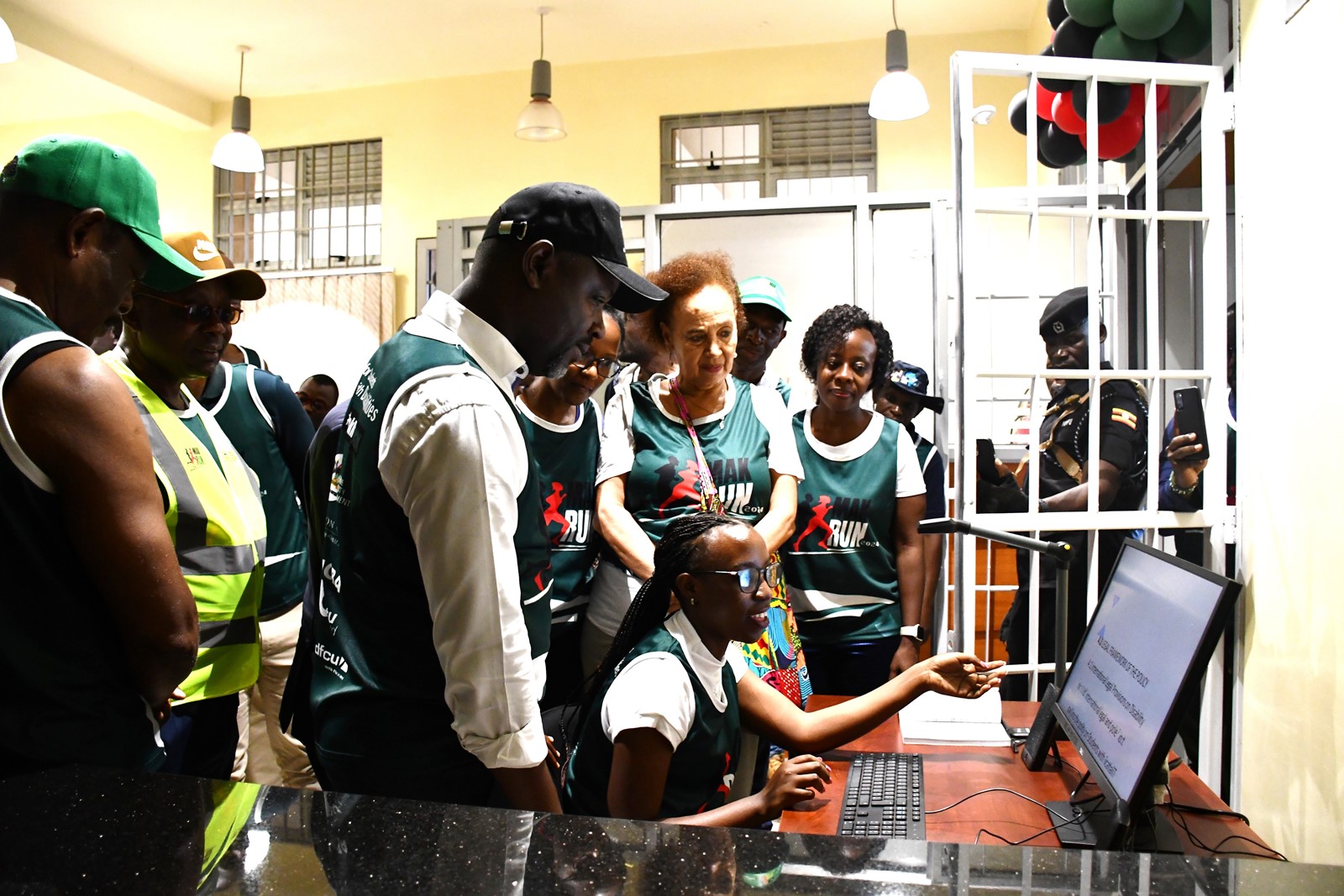
Students with disabilities at Makerere University have been requested to stop seeking for special attention and instead look for solutions and opportunities for personal growth.
This was during a mental wellness, inclusion and safeguarding session organized by the Dean of Students office and the Mastercard Foundation Scholars Program at Makerere University.
Addressing students on mental health and disability inclusion, Mr. Marvin Ggaliwango, a lecturer at the College of Computing and Information Sciences (CoCIS), noted that if the students stop complaining, they will become empowered to take charge of their own development, build resilience and engage confidently in both academic and social environments.
“Turn your lived experiences into tools for innovation. Stop complaining and start creating solutions for yourselves. You are the one living this life, and that gives you the authority to be an expert. When you develop a solution, it doesn’t just benefit you, it helps others too, by removing barriers,” Mr. Marvin Ggaliwango, said.
He encouraged students to see themselves not as victims of circumstance, but as active participants and co-creators of the inclusive environment they wish to experience.
“Learn how to communicate effectively and humbly. If you have a problem, express yourself clearly. Do not isolate yourself or feel resentful. You are not defined by disability, you may face disadvantages, but you still have ability,” he encouraged.
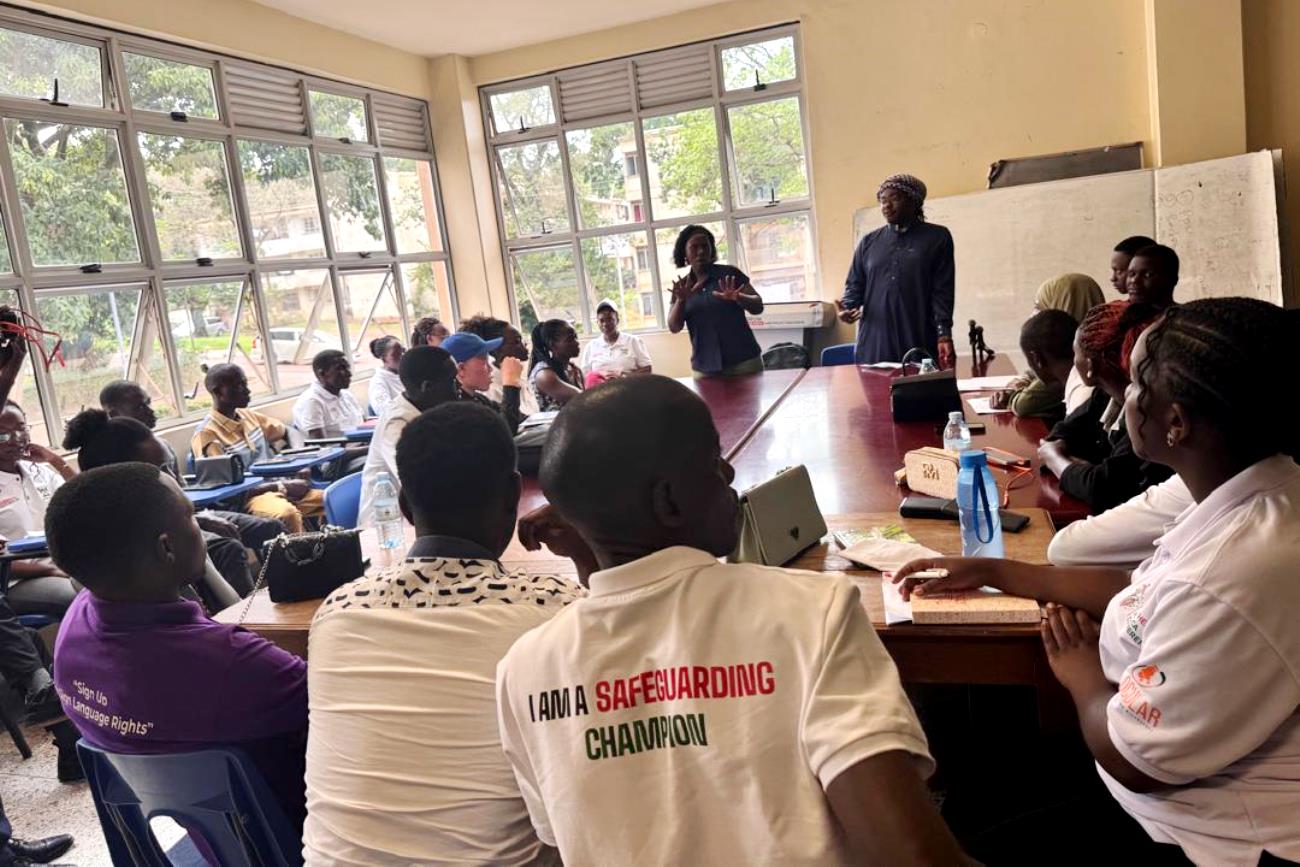
Throughout the session, students listened attentively as he emphasized the importance of self-awareness and personal responsibility, urging them to understand their strengths, acknowledge their limitations and take deliberate steps toward personal growth while contributing positively to the University community.
“We must enhance and ensure that our mental health is number one. Always choose yourself first. Choose what makes you happy and protect your peace. If you are at peace with yourself, your academics will improve. There is a strong link between mental wellness and academic success,” Mr. Ggaliwango, noted.
In his speech, Mr. Musa Mwambu, the Disability Inclusion Advisor at Light for the World Uganda, called upon the students with disabilities to enhance and ensure that their mental health is prioritized.
“As students living with disabilities, sometimes you over expect, because you have a disability you should be given, listened to and when people do not listen to you, you attribute it to your disability, get it from me, even those without disabilities are not listened too. Things are not happening to you because of your disability it is because of the world we live in. Everything that happens to you can happen to others,” Mr Mwambu, noted.
“Have fun with your life. Make yourself happy and be smart. Present yourself in public confidently wherever you go. The way you carry yourself can improve your mental health and how others perceive you,” Mr. Mwambu said.
He reminded the students that gaining admission to Makerere is itself a milestone.
“There are many people without disabilities who have never stepped at Makerere University. Find something that empowers you and hold on to it. You may have a physical impairment, but if you are brilliant in class, you can lead discussions and inspire others,” he added.

During the session, Dr. Rodney Rugyema, the Acting Principal Warden, welcomed the students back from the long holiday. He assured them that the University is committed to their safety and well-being while on campus.
Dr. Rugyema emphasized that the University has systems in place to protect students, both physically and psychologically and encouraged them to report any concerns promptly.
“When you are at the University, you are not on your own, we are always here for you. For us to engage you on mental wellness and inclusion, we want you to be in the right state of mind, whole and complete,” Dr Rugyema, said.
He added: “We are here to empower you and we are calling upon you not be a risk for yourself and always be able to detect risks that are likely to affect your mental health and works towards avoiding them and reporting them to ensure that the University manages them before they escalate into real harm whose impact is more serious than you can think,”
During the session, Ms. Diane Nabikolo Osiru highlighted the University’s broader commitment to safeguarding.
Safeguarding at Makerere University refers to measures put in place to promote safety and wellness of all students, staffs and other stakeholders.
“At Makerere University, safety is not a luxury for few. but it is a right for every student. As the semesters begins, we are urging you to learn how to identify signs of harm or abuses and report them to the appropriate safeguarding contact points,” Ms Nabikolo, said.
For support in case of any harm or abuse, International and Refugee Students, can access support through the Advancement and International Office, while Students with Disabilities, can utilize the Disability Support Center. Those with personal and emotional challenges, can visit the Counselling and Guidance Centre.
In his speech, Dr Joab Agaba, a Lecturer in the College of Computing and Information Sciences, guided students how to report risks and incidences to the MakSafeSpace, the e-reporting platform complimenting the other University traditional reporting channels.
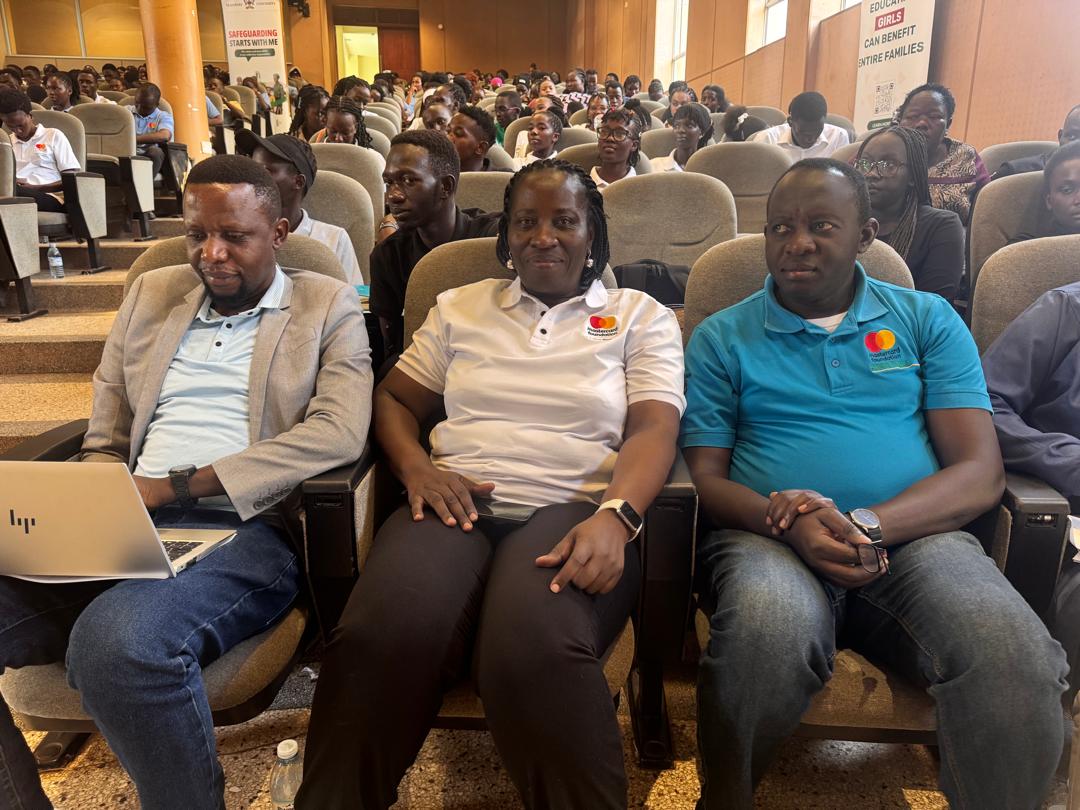
Mr. Henry Nsubuga, the Manager of the Counselling and Guidance Center, shared practical strategies for coping with stress effectively including time management, setting realistic goals, seeking support from peers or counsellors.
Students speak out
Shanitah Nahamya, 2nd year student of the Bachelor of Adult and Community Education
“I have learned how to respectfully and appropriately engage with students with disabilities. In the past, I often felt pity when I encountered them, but now I understand that what they need is not pity, it is respect, support, and equal opportunity.”
Guo Dorothy Geri, 1st year student of the Bachelor of Commerce
“I have learnt how to use inclusive language. Before offering help to a student with a disability, I will first ask them, because not all the time do they need our help. You might think someone wants to be helped to cross the road, yet they are waiting for someone.”
Valentines Doris Aduka, 1st Year student of the Bachelor of Biomedical Science
“I have been calling students with disabilities special names, thinking it was kind. But I have learned that they do not want to be treated differently or labeled in a special way. What they value most is being treated like everyone else, with respect, dignity, and fairness.”
Trending
-

 Humanities & Social Sciences1 day ago
Humanities & Social Sciences1 day agoMeet Najjuka Whitney, The Girl Who Missed Law and Found Her Voice
-

 Health6 days ago
Health6 days agoUganda has until 2030 to end Open Defecation as Ntaro’s PhD Examines Kabale’s Progress
-

 Agriculture & Environment4 days ago
Agriculture & Environment4 days agoUganda Martyrs Namugongo Students Turn Organic Waste into Soap in an Innovative School Project on Sustainable Waste Management
-

 General6 days ago
General6 days agoMastercard Foundation Scholars embrace and honour their rich cultural diversity
-

 Health2 weeks ago
Health2 weeks agoCall for Applications: Short Course in Molecular Diagnostics March 2026
